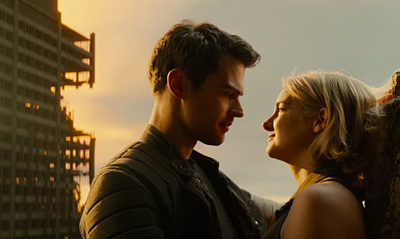Movie Review: The Divergent Series: Allegiant
Ben Gruchow
March 22, 2016
What you should infer from that bit of word salad is more or less subjective; there’s very little about Allegiant that will make much sense on a storytelling level if you’re not intimately familiar with not just the plot of the prior entries but the ethic of the entire world. Even this is not much of an inoculation against getting lost in the weeds: since the Divergent universe really makes little sense and holds together mostly as a series of rattletrap conveniences with which to issue vague, half-formed pronunciations about individuality and bureaucracy, you can watch these three films back-to-back and still not have much of an idea of who’s doing what to whom and why, and who’s pulling the strings, if anyone really is. You can probably figure it out based on deduction and induction, which are two components of intelligent thought that this movie is in short supply on.
The movie loyally follows the ethic down this rabbit hole, to the point where it begins to seem as if the filmmakers simply give up and begin making the plot up as they go along and tossing out concepts as they occur to them, with little thought given to structure or pacing. In Tris’ first meeting with the Director of the Bureau of Genetic Welfare (Jeff Daniels; who gets the Kate Winslet Award this time around for appearing in some pain at the thought of this film occupying such a prominent spot on his resume), he is outlining the difference between her and (seemingly) everyone else in the world, and it’s really rather remarkable how many times the screenplay fits the word "damaged" into a single short monologue, and how clumsy the result sounds. You have to imagine that this went through a couple of drafts with a couple of different eyes laid on it; all of them signed off on this material.
This purity-versus-damaged narrative, coupled with her visit to a mysterious council that seems pointless from a storytelling perspective only in hindsight, is intended to place Tris front-and-center in her own movie, and Woodley gives it what is, for her, a fair shot (though, it must be noted, she’s not as convincing as she’s been elsewhere in this series). It’s not much fun for me to note that this approach fails pretty hard. Nobody else involved is really any more interesting (although Teller’s slimy, insufferable Peter at least engenders some kind of reaction from us), but the movie pretty much neglects its main character to give some mildly interesting but woefully undernourished subplots to its supporting characters.
Where is the sense of commitment, the confidence in the approach, the establishment of an internal logic? The opening scenario of the film, concerning underground trials and summary executions of the people involved in the previous regime, strikes intriguing and unsettling tones; a truth serum is used on defendants to make them say exactly what’s on their mind; in a culture that seems to have comfortably assimilated the virtue of judging others by their actions and perceived motives rather than actual ones, and the utility of comprehending complex situations in facile black-and-white terms, there’s a shivery plausibility in seeing sham justice carried out under the mantle of populism or the will of the people. This plot thread, embryonic to begin with, is never developed further, and soon we’ve settled on terse conversations, terse pronouncements, terse looks—all of which seem to be building toward something, none of which actually do.
More than anything else, Allegiant suffers from a feeling of mercenary disinterest on almost every front: the filmmakers know that there is a plot development here and one there, and it’s executed with a modicum of competence and no emotional or narrative charge at all. The screenplay is suffocatingly dim and juvenile in its approach to science and human nature. Laborious exposition is given (and given, and given) in lengthy dialogue scenes where the camera points on one character, and then over their shoulder to the other, and over their shoulder to the other. We are given to understand just how little a difference $110 million in resources can make, with sloppy greenscreen compositing work (even in mundane interior settings, for some reason) and deeply unconvincing CGI. Everything and everyone is just going through the motions; frankly, there wasn’t a whole lot of cinematic promise inherent in the material to begin with, but that doesn’t make the result any less enervating to witness.
Continued:
1
2




